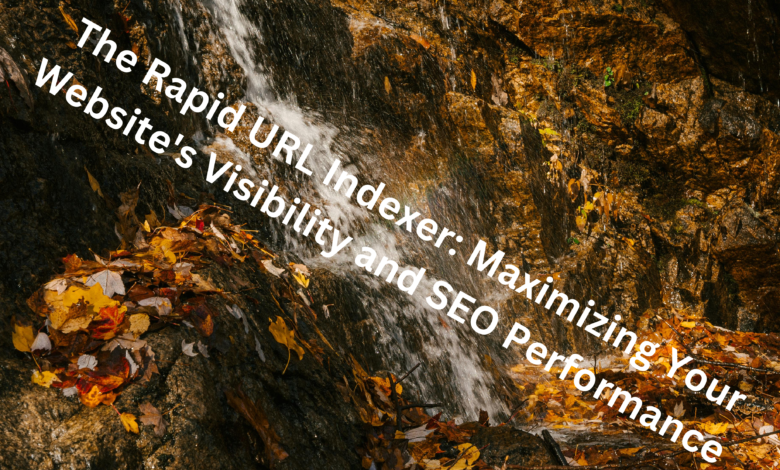The Rapid URL Indexer: Maximizing Your Website’s Visibility and SEO Performance

In today’s digital age, website visibility is critical for business growth, and search engine optimization (SEO) remains at the heart of achieving this. One crucial aspect of SEO that many marketers overlook is the indexing of web pages. This is where the Rapid URL Indexer comes into play. By ensuring that your web pages are quickly indexed by search engines like Google, Bing, or Yahoo, the Rapid URL Indexer allows your website to be more visible to users searching for relevant content.
This article will explore how a Rapid URL Indexer can optimize your site’s indexing speed and why it’s an essential SEO tool. We will also provide practical tips to ensure your website stays ahead in the competitive online space.
What Is a Rapid URL Indexer?
A Rapid URL Indexer is a tool that accelerates the process of getting web pages indexed by search engines. Search engines use crawlers (or bots) to index new and updated web pages. Usually, this process can take several days or even weeks. However, with a Rapid URL Indexer, you can drastically reduce this time, ensuring your content appears in search results much faster.
For example, imagine launching a brand-new page promoting a time-sensitive product or a limited offer. You don’t want potential customers to miss out because your page hasn’t been indexed yet. By using a Rapid URL Indexer, you ensure that your content is found almost instantly by search engines.
Why Is Indexing So Important?
Without indexing, your website might as well not exist. Indexing is the process that allows search engines to catalogue and store your web pages for future retrieval when relevant search queries are made. If your pages aren’t indexed, they won’t appear in the search engine results pages (SERPs), and potential customers will have no way of discovering your site organically.
A Rapid URL Indexer helps ensure that all your web pages get indexed promptly, boosting your chances of ranking high in the SERPs. This is especially important in competitive industries where time can be crucial in gaining a competitive edge.
How Does a Rapid URL Indexer Work?
A Rapid URL Indexer pins search engines and prompts them to crawl your website or URL. The tool submits the URL directly to search engines like Google and notifies them that it needs to be crawled. This process bypasses the average waiting time associated with natural crawling cycles.
While each tool may vary in interface and exact process, most Rapid URL Indexers share the same core functions. Here’s how a typical Rapid URL Indexer works:
- URL Submission: You input the URL(s) you want to be indexed.
- Search Engine Notification: The tool sends signals or pings to significant search engines.
- Search Engine Crawling: The crawlers come to your site to retrieve the new content.
- Indexing: Once the crawling is complete, the page is indexed and ready to appear in search results.
Key Benefits of Using a Rapid URL Indexer
- Speed and Efficiency: One of the most apparent advantages of using a Rapid URL Indexer is the speed at which your content can be indexed. Instead of waiting days or weeks, your new web pages could appear in search results within hours.
- Increased Traffic: Faster indexing means your web pages are visible sooner, potentially growing organic traffic. If you’re regularly updating your site with fresh content, the Rapid URL Indexer ensures that search engines reflect these updates quickly.
- Improved SEO Performance: Regularly using a Rapid URL Indexer as part of your SEO strategy ensures that no page is left unindexed. This helps improve your website’s overall SEO performance, as every piece of content can contribute to your ranking efforts.
- Real-time Marketing: If you’re running a time-sensitive campaign or limited-time offer, the last thing you want is for search engines to index your page too late. Using a Rapid-URL Indexer gives you the flexibility to ensure real-time marketing initiatives get maximum exposure.
- Content Authority: Being the first to have new content indexed on a particular topic can give you an advantage over competitors. Faster indexing allows your content to appear in SERPs sooner, potentially establishing your site as an authority in your industry.
Tips for Using a Rapid URL Indexer Effectively
To maximize the benefits of a Rapid-URL Indexer, consider the following tips:
- Submit Only Quality Content: Ensure that the URLs you’re submitting for indexing contain high-quality, original content. Search engines prioritize content that provides value to users, and submitting low-quality pages could negatively impact your rankings.
- Avoid Overloading the Indexer: While submitting all your URLs at once might be tempting, this could raise red flags with search engines. It’s best to use the Rapid-URL Indexer strategically and submit URLs at a consistent, manageable rate.
- Combine with Other SEO Practices: A Rapid URL Indexer should not replace other SEO practices. Ensure you’re still optimizing your content with relevant keywords, internal links, meta descriptions, and high-quality backlinks to get the best results.
- Monitor Indexing Progress: After submitting your URLs, monitor your website’s indexing status using tools like Google Search Console. This will help you identify any issues and ensure your pages are indexed as expected.
- Submit Updated Pages: If you’ve significantly updated a page, use the Rapid URL Indexer to resubmit it for indexing. This ensures that the search engines take note of your changes and reflect them in the search results.
Rapid URL Indexer and SEO Tools Integration
Many website owners and SEO specialists use a Rapid URL Indexer alongside other SEO tools for the best results. Integrating the indexer with tools like Google Search Console, SEMrush, Ahrefs, or Screaming Frog lets you get a complete overview of how well your site is being indexed and what improvements can be made.
For example, if Google Search Console shows that some pages are still not indexed after submission, you can use a Rapid URL Indexer to accelerate the process. Combining this with keyword analysis tools, backlink checkers, and competitor analysis can give you a holistic approach to improving your website’s search engine performance.
Common Misconceptions About Rapid URL Indexers
- Instant Rankings: Many people mistakenly believe that using a Rapid URL Indexer will instantly improve their search engine rankings. While indexing is essential, your website’s ranking depends on various factors, including the quality of your content, keyword usage, and the strength of your backlinks.
- Guaranteed Indexing: Using a Rapid URL Indexer does not guarantee that every URL will be indexed. Search engines still assess the relevance and quality of your content. If your page doesn’t meet these standards, it may not be indexed, regardless of how many times it’s submitted.
- Overusing the Indexer: Submitting too many URLs too quickly can be seen as spam by search engines. This can harm your SEO efforts rather than help them. Use the tool cautiously and avoid submitting excessive URLs in a short period.
Final Thoughts: Is a Rapid URL Indexer Right for You?
In an era where time equals visibility, the importance of fast and efficient indexing cannot be overstated. A Rapid URL Indexer is an invaluable tool for those looking to speed up the indexing process and get their content in front of their target audience more quickly. Whether you’re running a blog, managing an eCommerce store, or overseeing a large corporate website, the benefits of a Rapid URL Indexer are clear.
However, it is essential to use it as part of a broader SEO strategy. Ensure your website is optimized for users and search engines, with high-quality content, relevant keywords, and a robust backlink profile. When used correctly, the Rapid URL Indexer can significantly boost your online presence and help you stay ahead of the competition.
FAQs About Rapid URL Indexers
Q: How quickly does a Rapid URL Indexer work?
A: The time can vary depending on the tool, but many Rapid URL Indexers can have your page indexed within hours, compared to the average wait time of several days or weeks.
Q: Can a Rapid URL Indexer harm my website’s SEO?
A: If used correctly, no. However, overusing the tool or submitting low-quality content can lead to negative SEO consequences.
Q: Should I use a Rapid URL Indexer for every page on my site?
A: Not necessarily. It’s best used for new, updated, or time-sensitive content that you want search engines to index quickly.
Q: Is there a free version of a Rapid URL Indexer?
A: Some free versions are available, though premium options typically offer faster and more reliable indexing.
Sources:




